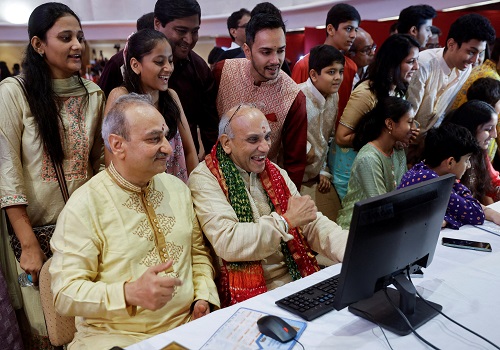Excitement and worry as stock options trading booms in India

Follow us Now on Telegram ! Get daily 10 - 12 important updates on Business, Finance and Investment. Join our Telegram Channel
A sudden explosive growth in stock options trading in India this year has got the country's retail traders excited and regulators worried about the risks such speculative fervour could spawn.
The boom in derivatives trading in the country's historically conservative markets, where some products such as stock futures are still too expensive, has come after stock exchanges changed some options contracts to facilitate quicker and cheaper bets and as online retail trading platforms mushroomed.
Data from exchanges, which are big winners of this surge in demand, shows the daily average value of assets underlying these stock options more than doubled between March and October to $4.2 trillion. The ratio of the notional value of derivatives to cash trading is the highest in the world.
India's stock market regulator Securities and Exchange Board of India (SEBI) has so far not stepped in to curtail the trading but has issued warnings and said it is aware of the risks.
Market analysts are concerned.
The surge in options activity is more speculative than for hedging purposes, said Mihir Vora, chief investment officer at Trust Mutual Fund. "This can magnify any sharp falls in the market and act as a potential risk," he said.
SEBI and the top Indian exchanges, the National Stock Exchange of India Ltd (NSE) and BSE Ltd, did not respond to e-mails from Reuters.
But Ashish Chauhan, the head of the NSE, said in a message to investors: "Trade in derivatives by retail investors should be avoided because of the high risk involved. Be a long-term player."
Analysts point to historic examples of rookie retail investors being hurt by derivatives trading, notably in South Korea in the early 2000s when regulators had to enforce barriers to retail participation.
Moreover, India's more nascent derivatives markets lack guard rails. Regulators have so far not mandated any minimum net worth or investor qualifications for those trading stock options, and the stock markets almost always rise each year - both recipes for higher risk-taking and complacency.
Dozens of digital trading platforms such as Zerodha, Groww and AngelOne, have become the top brokerage firms in the past couple of years, as a fintech boom and the stay-home environment from the pandemic drives small investors seeking a quick return towards robo-trading and other low-cost platforms.
Axis Mutual Fund estimates there are 4 million active derivatives traders in the country. The traders are mostly small players, according to SEBI data.
Axis said in a report there is as much as 500 times leverage on some options, meaning a 2,000 Indian rupees ($24.01) bet gives the option holder 1 million rupees worth exposure, and often retail investors were holding these bets for just 30 minutes on average.
RETAIL FRENZY
The total number of derivative contracts traded on the National Stock Exchange - which accounts for a bulk of options trading volumes - was 39.85 billion between April and September, almost near the 41.76 billion traded in the financial year that ended in March 2023.
As much as 99% of these are options contracts, which allow holders to bet on a stock or index rising or falling by paying a fraction of the value of the shares.
The "stark" increase in daily options trading turnover raises issues of investor protection, said Ajay Tyagi, former SEBI chief. "There is froth in the market and retail investors are looking to make easy money with limited understanding."
Kailash Plaza, a building in Mumbai's eastern suburbs, has become one of the focal points of the boom, with hundreds of stock market traders, brokers and investment advisers crammed into offices spread across five storeys.
Bhavesh Shah sits in a tiny cubicle behind a translucent door in the plaza. A notice on his door promises that at 500 Indian rupees ($6.00) per month one could make up to 150,000 Indian rupees.
Shah says his youngest client is 21 years old and is investing small sums of money earned from odd jobs. "These youngsters play a lot of games; they think of this as a game as well," he said.
SEBI WARNS AND WATCHES
SEBI will soon mandate that all large brokerage firms give out specific warnings on market risks, said two sources who are familiar with the regulator's thinking. SEBI is also nudging stock exchanges to review incentives offered to large volume traders, they said.
There have also been preliminary discussions on an increase in taxes that might reduce speculative activity, said a third source familiar with the discussions.
However, decisions on taxes are taken by the government and the regulator can at best recommend such a change.
The sources declined to be named as they were not authorised to speak to the media.
Zerodha, one of India's largest discount trading platforms, says more than 65% of its users are first-time investors and over 60% of new accounts come from small towns. The average age of users that joined in the last year is 29.
The platform has seen an uptick in futures and options trading activity, Zerodha said in response to Reuters queries.
People dallying in financial markets in India's bustling small towns are usually less savvy than in trading hubs like Mumbai or Ahmedabad.
Despite the risks, many young investors remain fired up.
Siddharth Joshi, a 36-year old from Surat in western India, said he lost 200,000 rupees trading options on Adani Enterprises shares in January. But he's not giving up, he told Reuters by phone.












 320-x-100_uti_gold.jpg" alt="Advertisement">
320-x-100_uti_gold.jpg" alt="Advertisement">









